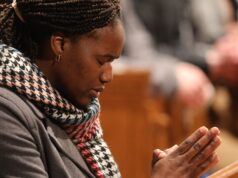Q: I read online that a married Catholic needs their bishop’s permission to separate from their spouse. My husband abandoned our family to live with his girlfriend. How can I get our bishop to make him come back home?
A: I’m sorry you’re going through such a difficult situation. I don’t know exactly where you were finding your information online, so I can’t comment on the accuracy of what you read.
In broad terms, it is true that the church’s law obligates spouses to maintain a common marital home under normal circumstances. As we read in Canon 1151 of the Code of Canon Law: “Spouses have the obligation and the right to maintain their common conjugal life, unless a lawful reason excuses them.”
Likewise — very strictly speaking — in principle, canon law also envisions a Catholic as needing their bishop’s permission to separate from their spouse. However, at the same time the law also provides a fairly wide “loophole.”
A relevant citation here is Canon 1153, 1, which tells us: “A spouse who occasions grave danger of soul or body to the other or to the children, or otherwise makes the common life unduly difficult, provides the other spouse with a reason to leave, either by a decree of the local Ordinary or, if there is danger in delay, even on his or her own authority.”
Obviously, this means that a Catholic in a physically dangerous abusive situation could leave the marital home as soon as they were able, without asking any kind of permission. But canon law also allows a faithful Catholic to separate “on his or her own authority” for less dramatic reasons. For instance, a spouse who was living a seriously sinful or otherwise gravely disordered life (e.g., suffering from a severe addiction) and providing a scandalous example for their children would be a cause of moral danger or “danger of soul,” which would justify the other spouse leaving on the basis of their own discernment.
In the vast majority of cases, when a devout Catholic chooses to separate, it is for one of these justifiable reasons. This is why, practically speaking, most dioceses do not have a set process for obtaining the local bishop’s permission for leaving the marital home. (Though whether or not dioceses should have some protocol in place for this is perhaps another question.)
Your concerns are approaching this issue from somewhat of the opposite perspective. With respect to spouses’ responsibilities, the law tells them what their obligations are. Naturally, it is to be expected that a Catholic serious about their faith will take these obligations to heart and strive to fulfill them. And besides being illicit, abandoning the marital home for adulterous purposes is clearly a grave sin which the church would never condone.
However, canon law does not give bishops coercive power to force spouses to fulfill their responsibility of marital common life.
Part of this is a matter of logistics and practical reality. That is, bishops do not have anything like a diocesan police force that is empowered to compel individuals to remain in places they wish to leave.
On a pastoral level, bishops and even parish priests can of course exhort and encourage a spouse who leaves their family for sinful reasons to return to their marital home. And if the abandoning spouse continues in their illicit separation, canon law directs them to refrain from receiving Holy Communion (Canon 916); and depending on the specific circumstances, they might even be appropriately denied Communion if they approach the sacrament anyway (Canon 915).
Yet the Catch-22 here is that only a faithful Catholic would be interested in listening to their pastors, obeying canon law, avoiding sin and receiving the sacraments. But a person who willingly abandons their spouse for sinful reasons is probably not a Catholic who takes the faith seriously enough to be swayed by their pastor’s admonishments or to be concerned about the sacramental consequences of their actions.
Jenna Marie Cooper, who holds a licentiate in canon law, is a consecrated virgin and a canonist whose column appears weekly at OSV News. Send your questions to CatholicQA@osv.com.









